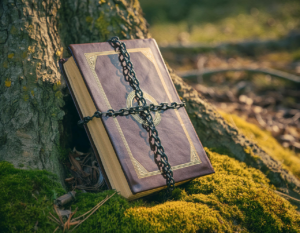Posts by Kristin Hacken South
Imagine you’re reading a work of fiction and you come across the names of two characters, Etazik and Walluba. Which would you guess to be the bumbling apple-shaped sidekick? Which one is wiry and quick-witted?
Just as importantly, how self-evident did that conclusion feel to you?
In a valuable recent post, Jeanne Kisacky showed how a name can reflect gender, religion, birth cohort, heritage, and cultural background. Today’s post extends the importance of thoughtful naming to the cellular level of sound.
A famous linguistics experiment uses the nonsense terms kiki and bouba to describe either a curvy blob or an angular pointy star. Devoid of any context, a significant number of respondents consistently associate the sharp-edged star with the quick, explosive sounds of kiki, while the rounded bouba with its languid pronunciation seems a better fit for the curvy blob. This finding holds across speakers of multiple languages and readers of multiple scripts.
I first came across these ideas when I earned my keep as a linguistic analyst, which meant, in part, that I read dictionaries in ten languages to check a proposed name’s associations in international markets. In 2003, for instance, the debut of the Buick LaCrosse was delayed when the company learned that a new, sexualized meaning of lacrosse had developed among Quebecois teens. The car name was changed in Canada, and many a linguistic consultant like myself was kept in business by worried marketing teams.
The conscious level of meaning is the one we commonly think about. Most names are chosen on this level, but another part of my naming work included examining the ways a given name might resonate in the subconscious realm.
The field of phonetic symbolism argues that sounds are more than just building blocks for words: the physical movements to produce them create subconscious meaning. Sounds are made by forcing air out of the lungs through the nose or the throat and over different parts of the mouth—the tongue, the teeth, or the lips. Each movement creates a different sound and, with it, a corresponding sensation.
Move your teeth close together and push your tongue upward. The vowel that results is the tiny bright [ee] sound. Gradually open your mouth while you continue to voice the vowel and it widens and deepens into [ehh]. A slack, open mouth makes the neutral schwa [uh] and the noncommittal [ah], then the [oh] and [oo] sounds result as you close your lips. The front vowels are petite and bright; the back vowels, with a cavernous closed mouth, produce a sense of wonder and awe (ooooh!). The meaning, according to phonetic symbolism, mirrors the production of the sound.
The staccato sounds of [t], [k], and [p] occur near the front of the mouth and require a puff of air in their production. These plosives, bright, shiny, and sharp, literally make a word pop. But put too many together, especially with the excitable front vowels, and you create a discomfiting cacophony. It’s hard to take something seriously when it’s tacky, teeny, icky, sticky, itsy-bitsy. Combine memorable and bright plosives with smooth vowels and a nice liquid sonorant, though, and you have a drink that aids focus but goes down easily: Coca-Cola.
The sonorant consonants, [l], [m], [n], [ng], and [r], force air through […]
Read MoreThe violent metaphor of writers killing their darlings has never appealed to me. I understand that we sometimes need to disrupt the comfort of our revision process, but may I suggest something a little less murderous? Tasty, even?
One of the treasured picture books of my childhood was Stone Soup. Have you read it? In this retelling of an old European fable, a hungry traveler approaches a village known for its miserly inhabitants. Desperate for food, he concocts a trick to get them to feed him. He sets up a large cauldron in the middle of the town square and fills it with water, then places a stone in the bottom of the cauldron. As it heats up, a villager comes to ask him what he’s doing.
“I’m making stone soup,” he replies, stirring the water and occasionally taking a sip. “It’s coming along nicely, but it would taste better with salt.”
The curious villager runs home and brings back some salt. By now, a crowd has gathered. The traveler seasons his soup with salt, takes another sip, and sighs. “An onion or two would be just the thing,” he says. A second villager brings an onion.
On and on it goes, with the additions of carrots, potatoes, and whatever else would go into a hearty stew. At the end, he fishes out his stone and shares a delicious meal with the no-longer hostile and selfish village. Together they’ve created stone soup.
This story delighted me on multiple levels. I loved the ingenuity of the newcomer, the gradual and piecemeal thawing of the villagers, the delicious soup that fed them all. I loved the chutzpah of fooling an entire town into thinking that a stone chucked into some boiling water could become something worth consuming.
As an adult, I still delight in the story of stone soup, but now I read it as a good metaphor for writing (isn’t everything?).
Your brain picks up a shiny bauble of an idea. It might be an interesting character, a fabulous setting, or a devilishly twisty plot. If a story in its most simplified form is simply a person, in a place, with a problem, then any of those three elements could be the stone tossed into the cauldron of your imagination.
The water comes to a boil as you go about your daily life. Soon, if your mind is at all like mine, your subconscious starts to sniff around. What’s cooking? Is it any good?
The nay-saying villagers who have colonized my mind, at least, can be a pretty suspicious bunch. They tell me that a rich and hearty story will never result from that bare rock sitting at the bottom of my pot—but they can be tricked into sharing the observations that are hidden inside the cupboards of my memory.
With a little persuasion, they open the cabinets and rummage around. Ideas, snatches of conversation, resonances from other books, and intriguing people I’ve met all add ingredients to the mix:
That guy with a scar that I saw at the bus stop? He’d make a perfect salty foil.
That snatch of conversation I overheard in the coffee shop? Unexpected zest.
That book I just finished reading, the one that tells its story in layers like an onion? I might slice it […]
Read MoreThe view from the Upper Lodge at Mvuu, in Liwonde National Park, Malawi.
I’m sitting in a wicker chair and looking out over the Shire River from the comfort of what is essentially a glorified tree house. It’s been drizzling off and on since my son Caleb and I arrived two days ago. Staff at the lodge here in Liwonde National Park have joked that we brought the rain with us; the wet season in Malawi usually starts over a month from now.
Caleb invited me on this trip, created the itinerary, and paid for everything. I have no responsibilities other than to be a good traveling companion. To that end, I left my computer at home, as naked as that makes me feel, and am equipped only with a powerful set of binoculars and the notebook in which I’m writing these observations. It’s enough. If I record as many sensations and impressions as I can, in the moment, I won’t forget them by the time I return home.
A small yellow bird alights in the nearest tree and I snap to attention: Caleb and I have catalogued all of the birds we’ve seen since we arrived. So far, we’ve added about seventy new species to our life lists with the help of our formidable guide, David.
The lowing of a hippo from across the water distracts me and when I look back, the yellow bird has gone. I hadn’t meant to look — after all, this lodge is called Mvuu, which means “hippo,” because there are so many of them around — but I haven’t been here long enough to feel blasé about hippos, not yet.
No matter, I tell myself. I know the importance of details and I remember enough of them. The bird was about the size of a canary, with a white breast and wings that showed a bright yellow underside when it flew. I turn to my trusty Merlin Bird ID app, punch in the identifying information, and fail to find a perfect match. Was it some kind of weaver? Several species live around here. Or an Eastern Nicator? No, the coloring on this bird is too bright. A Cabanis’s Bunting? No, the breast was white, not yellow.
The nearest I can come is the Village Weaver, but I’m not satisfied. I wish I’d taken note of the shape of its beak and the color of its eyes before I looked away. Some of the birds I’ve seen here have been easy to identify – the Böhm’s Bee-eater, the Lilac-breasted Roller, the Malachite Kingfisher – because they have distinctive colors and shapes. This one, not so much; dozens of birds are similar. Here’s looking at you, convergent evolution.
I pull out the big guns: a 500-page hardback tome called Birds of Southern Africa (Expanded Edition). I turn to the weavers and find several possible candidates based on size and colors. I narrow it down, possibly, to a Spot-backed Weaver. I still have to confirm if they have yellow underwings, so I turn to Google.
Score. Google tells me that the Village Weaver is also known as […]
Read More
Several years ago, as a young teacher, I sat down for a one-on-one with my academic dean. I don’t recall the specifics of the meeting nor the outcome. I do recall that during that meeting, seemingly out of nowhere, he asked me if I knew the definition of the word “solipsistic.”
I did not.
He shared the etymology: solus, “alone” + ipse, “self” in Latin. The two terms combine to mean “only I exist/matter.” A solipsistic person acts as if it were so. He mildly provided me with this information and left it at that. Only later did I wonder why he felt the need to school me in this particular idea. He was on the younger side himself and we had a cordial relationship. Was he just being the nerdy word enthusiast I knew him to be, or was he aiming to send a more subtle message about me and my teaching? If so, it was too subtle for me to grasp.
Around that same time I met a business student who proposed a thought experiment: what if the world and everyone in it are an elaborate illusion and all of you exist only in my mind? He didn’t identify this idea by name, but what he described is a well-known philosophical thesis known formally as solipsism: I can only establish that my own thoughts exist; everything else is filtered through my mind and thus cannot be experienced directly.
On a less esoteric level, solipsism is generally synonymous with being self-centered, and it therefore makes me uneasy to think my academic dean was applying it to me. Where I grew up, “selfish” was a bad word. Not in the “damn/shit/hell” way, where I’d get in trouble for saying it, but in the “liar/cheater/fan of Neil Diamond” way, where a person was judged for being it.
Nowadays, though, I suspect that a certain amount of solipsism is damn useful for those who aspire to the writing life. Maybe even necessary. Does any of my experience sound familiar to you?
Read More
I’ve been in multiple book clubs, each with its own personality and reading preferences. I love book clubs for the discussions they foster and for the enthusiastic recommendations that members of those clubs make. As a result of my book clubs, I’ve read many books I would otherwise have skipped over or never even known about.
Several of my book clubs over the years have included readers who qualify their book recommendations by listing and justifying any undesirable (by their definition) elements of the book: it has a lot of swearing, but the story is important. It includes one sex scene, but it’s not too explicit. There’s a really gruesome murder, but it’s just the first chapter. For these readers, the value of the story triumphs over qualms about specific content.
Other times, the concerns win out: I wanted to read it but my sister told me it uses the f-word a lot. I don’t read books with sex scenes. And so on.
Book banning and cancel culture have become common on all political sides, with everyone citing the same putative benefit of preventing exposure to harmful content or individuals. Devoted readers and writers of all stripes, however, condemn book banning because it removes individual agency and panders to the fear that one’s own truth cannot withstand honest scrutiny.
So what should we think about self-censoring?
I believe everyone should have the right to decide for themselves what they will and won’t read, so deciding against something—while leaving it available to others—is as valid a choice as its opposite. I submit, however, that society as a whole benefits when we are willing to push our own boundaries enough to sit with the discomfort that some elements of story create.
I once taught a history class with an accompanying film lab. Every week we discussed a set of readings related to a single topic and then watched a film on Friday afternoon that explored the same issues in a way that added complexity or that drove it home in a more visceral way. My classes consisted of university students, aged 18 to 23.
One semester I taught a student—an adult, by definition—who refused on moral grounds to watch any film rated higher than PG-13. He also looked up the content of unrated films on the list, like The Third Man, and decided whether or not he considered them suitable (that one wasn’t, in his view, due to the inclusion of a two or three second scene in which a woman is dancing suggestively in a club).
Apart from making me look like an irresponsibly wanton corrupter of youth, his refusal saddened me because of how it limited his understanding. Thoughtfully told stories can drive home a lesson like nothing else can. I’ll never forget the stunned silence in the auditorium at the end of Paradise Now or the lively discussion that followed Hero. In a similar vein, I pity the readers who refuse to read Demon Copperhead because it uses authentically graphic language or who condemn the Harry Potter books for taking place in a world of witches and wizards. I can respect these readers’ adherence to their values, but I also see how my own willingness to suspend judgment has enriched my life in ways […]
Read More“Do anything rather than marry without affection.”
(All quotes from Pride and Prejudice, by Jane Austen.)
Memorable stories often revolve around one big idea, commonly known as the theme. Theme has been defined a thousand ways. I envision it as the broth in which the story stews, the skeleton on which the story hangs, the night skies in which the constellations shine.
The theme imparts a general truth cloaked within the particulars of the story. It gives coherence to the plot and a direction of growth for the characters. “What constitutes a lasting friendship?” is a theme of Tomorrow and Tomorrow and Tomorrow, by Gabrielle Zevin. “What is the price and reward of sisterhood?” is a theme in The Once and Future Witches, by Alix Harrow. “How is truth warped by the goals of the narrator?” might be a theme of Trust, by Hernan Diaz.
“There is, I believe, in every disposition a tendency to some particular evil–a natural defect, which not even the best education can overcome.”
The overarching theme of all of Jane Austen’s books is “how do human weaknesses stand in the way of love?” She gives us pretty unsubtle hints. The vices that name her books — pride, prejudice, over-reliance on sense, excessive emotional sensibility, and succumbing to persuasion — all thwart the relationships we know were meant to be.
The thematic truth of Pride and Prejudice, for instance, is that humility (the opposite of pride) and accurate judgment (the opposite of prejudice) are necessary for love to prosper. Pride overvalues oneself, while prejudice undervalues others. Both are erroneous ways of thinking that undercut meaningful relationships.
These ideas may be true, but simple statements of this sort fail to engage a reader. So how does a successful writer expose thematic truths without resorting to bald, uninteresting claims? The answer, as so often, is show, don’t tell, and Robert McKee’s Story presents one way to do it.
McKee’s “thematic square” is a rubric for expanding the impact of a story’s theme. Desmond Hall explained it in more detail last year. Essentially, start with a big concept-the thematic truth–then view it from several incomplete or conflicting angles. McKee organizes these angles through four complementary lenses:
Although written nearly 200 years before the publication of McKee’s handbook, Pride and Prejudice is a masterclass in how to apply his thematic square. Its storylines include a myriad of characters whose personal lives are a mess. Together they illustrate how subpar relationships result from a lack of one or both of the thematic virtues of humility and accurate judgment.
1. Thematic truth: Pride and prejudice get in the way of true love.
“He was the proudest, most disagreeable man in the world, and everybody hoped that he would never come there again.”
Both Elizabeth and Darcy are consumed by these faults as the story begins. Their arcs of change require seeing the error of their ways.
(Yes. This is all terribly simplified and incomplete and I apologize to the true fans out there. Leave your additions and corrections in the comments!)
2. Truth contradictory: Excessive humility
“He may live in my memory as the […]
Read MoreOne of my favorite reads as a child was a delightfully clever and funny book called The Phantom Tollbooth. In it, a bored and world-weary young man named Milo passes through a magical tollbooth and is drawn into adventures with a companion called the Humbug (literally a bug) and Tok, an enormous dog. Near the end of the book, the following conversation occurs:
“There was one very important thing about your quest that we couldn’t discuss until you returned.”
“I remember,” said Milo eagerly. “Tell me now.”
“It was impossible,” said the king, looking at the Mathemagician.
“Completely impossible,” said the Mathemagician, looking at the king.
“Do you mean—” stammered the bug, who suddenly felt a bit faint.
“Yes, indeed,” they repeated together; “but if we’d told you then, you might not have gone—and, as you’ve discovered, so many things are possible just as long as you don’t know they’re impossible.”
— The Phantom Tollbooth, by Norton Juster
As a literal-minded child, I didn’t understand this conversation. The no-longer-malcontented Milo has just completed an impossible quest. How can that be, though? If he accomplished it, by definition it was possible, right? So why did they say it was impossible? Clearly, something was afoot and I spent years trying to reconcile the disconnect.
A few years later, as a wide-eyed teenager, I came across this gem:
The future belongs to those who believe in the beauty of their dreams.
— Eleanor Roosevelt
I loved this quote at once. It went into my little book of precious truths, alongside other favorite quotes. I read it as a “you go girl” kind of affirmation: Eleanor was telling me that my dreams were beautiful and worth pursuing. I dreamed and I believed. The future was mine.
The combination of these two ways of thinking led me to the assumption that anything was possible, even things that seemed impossible, as long as I believed. When it came to writing, nearly forty years later, I believed twice as hard. All my life had led to this. I would just write some wonderful things; others would recognize their brilliance; all those years of longing and unrequited belief would be vindicated.
(Yes, I hear you laughing. I’m laughing too, in the crying-and-tearing-out-my-hair sort of way.)
I don’t see initial naïveté as a bad thing. For many a beginning writer, a belief in the beauty of her dreams can propel her through the shock of her first honest feedback from more seasoned writers and past the pain of a hundred rejections from agents and editors. There comes a point for those who persist, though, when naïveté yields to the reality of the publishing business: to misquote a classic source, we eventually learn that it is easier for a camel to pass through the eye of a needle than for a new writer to find an agent and publisher. So now what? Was the future never as beautiful as she had imagined?
Last month I wrote in praise of broad interests and experiences (you go, Thomas Young!). Today I want to circle back around to Champollion-level focus and persistence.
When I joined my second critique group (I’m now on my third), all eight of the members were fairly young in our writing. All of us were […]
Read MoreQuick note: Kristin Hacken South is in Egypt today, doing some of the things she loves best, including excavating artifacts. With iffy connectivity issues and a computer on the verge of mummifying itself, she’ll respond to any comments as she can.
Do you worry, as I do, that you’ve frittered away your best years and are coming to your real work too late? If so, consider the examples of two nineteenth century scholars, Jean-François Champollion and Thomas Young.
Champollion and Young started out with similar educational backgrounds that pointed them toward the decipherment of ancient languages. Champollion was fluent in seven languages by age 11 and added four more by 17. He did not confine himself to European languages, but studied Ethiopic, Chaldean, Persian, and Chinese, among others. By 14, Young was fluent in eleven languages including Syriac, Turkish, and Arabic. Both were curious enough about the mysterious Egyptian languages that they made a special study of them.
Here’s where they diverged: Champollion obsessed over the study of Egypt. In 1806, he wrote to his parents regarding Egypt, “I want to make a profound and continuous study of this ancient nation.” He was 15.
Champollion brought a single-mindedness to his study of Egyptian hieroglyphs that allowed him to upend established paradigms about this “sacred script.” He studied Coptic, the final stage of the ancient Egyptian language, with a native Egyptian and gave his first lecture on the connection between Coptic and hieroglyphic Egyptian at age 16. In 1809 he declared to his brother “I give myself up entirely to Coptic…I wish to know Egyptian like my French.” Keep in mind that Champollion was French.
As an adult, Champollion continued to focus all of his studies on Egyptian languages. Finally, in 1822, the acquisition of a new set of ancient texts allowed him to confirm the accuracy of his theories. He ran to tell his brother “I’ve got it!” and collapsed onto the ground. (Unlike the first marathon runner, he later recovered.)
Whatever people might think of Champollion personally – he was loudly on the wrong side of the politics of his day, and he stubbornly refused to credit the ways in which his study of hieroglyphs benefitted from Young’s work – I can’t help but admire his passion. He was arrogant enough to believe he would solve an intractable problem and pigheaded enough to keep working on it for years until he finally did.
But what if I told you that Thomas Young, whom you have probably never encountered until now, was arguably the more brilliant of the two? Consider: in 1813 he decided to pick up the study of what he called “enchoric,” later known as Demotic, the language wedged between the hieroglyphs and the Greek on the Rosetta Stone. By 1814 he had completely translated the inscription. You read that right: he decided to tap away at it and a year later he’d cracked it wide open. He’s rightly credited with deciphering a language that I as a student called Demonic because of its impenetrability.
Young’s contributions to the study of hieroglyphs had the potential to be equally transformative, but there’s the catch: “potential.” Young was a polymath, a brilliant scholar who […]
Read MoreLast month I mused on possible definitions of melodrama and why it’s such a dirty word. I asked you to comment on it and y’all came through. Thank you! Some thoughts on your replies:
Melodrama is not a synonym for high emotion. If anything, melodrama is its counterfeit. Melodrama plunks out a single emotional note and insists we sing along. Emotionally resonant literature, by contrast, offers a symphony in which sensitive listeners can identify a range of melodies, harmonies, and motifs, and can choose which ones to follow and how to hum along.
Likewise, apathy is not a synonym for reticence. Some genres expect more muted or indirect access to emotion than others, but all fiction requires an appeal to feeling of one sort or another. A book that leaves its readers with an emotional flatline is like a car without a working engine: it fails to transport anyone.
Both extremes reflect a lack of balance. This imbalance can manifest as (1) character responses that don’t align with what causes them, (2) a surfeit or lack of misfortune that flattens the narrative arc, or (3) emotions that are not shared by the reader. If Goldilocks represents a “just right” medium, then these extremes are her three [un]Bear[able]s.
The first unBearable: too big or too small
The first unBearable is a character reaction that is too large or too small or otherwise inappropriate. Goldilocks has the antidote: write characters with responses that match their experiences.
Parents faced with disciplining their teenagers (or toddlers!) are often told that the punishment should fit the crime. A teenager grounded for a month for neglecting to rinse her plate will not respond with a desire to do the dishes. One who wrecks the family car and only loses a week of allowance will not be deterred from reckless driving. The lesson for parents as much as for authors of fiction is to avoid over- and under-reaction.
When characters experience a catastrophe or windfall or death or reunion, they should respond in the same way as a real person of their kind would do, with devastation, joy, hopelessness, a new spring in the step. Readers do not want to sit with a story that displays false or missing responses.
By contrast, emotional honesty engenders trust. When I first read the third book of the Hunger Games trilogy, I hated the ending. Katniss, our ever-successful protagonist, whom we’d followed for hundreds of pages over three books, did not end up as a peaceful, wise leader. Instead, all that she had experienced finally broke her.
Suzanne Collins chose honesty over false comfort: this is how people actually respond to trauma. This is how dictatorships maintain their hold. This is what happens to a culture that glorifies violence and disregards poverty. Even the best of us can fall apart, when we experience loss after loss. I did hate this ending, but now I respect its author for telling a hard truth, even if I wish the truth were different. Suzanne Collins gets it just right.
The second unBearable: too hard or too soft
The second unBearable is a story that pushes too many feelings at a reader too quickly, or that doesn’t evoke emotion at all. Goldilocks would create a storyline that arcs between highs and lows, with enough […]
Read MoreI keep three plants in my study. They sit by the window and breathe greenery into my soul whenever I’m nearby. Two of these three plants are of the low-maintenance type I prefer. Like children, they thrive with a bit of benign neglect. They take it in stride (in root?) if I forget to water for a week or two, and only offer some mild crisping around the edges to let me know that they’re thirsty.
The third, though? It complains bitterly. If I don’t water it as often as it thinks I ought, all of its stems and leaves dramatically droop over the course of mere hours, so that the entire plant collapses to half its normal height. On more than one occasion, I have entered the room to find it flopped like a professional soccer player, or an exhausted prima donna at the end of her starring performance. On those days, I have been known to tell it out loud, “Stop being so melodramatic!”
Thus far, the plant has not responded as desired.
Meanwhile, across the room at my computer, the seedling of my current novel has taken tentative root. It sprouts from the rich soil of a catastrophe in the life of my main character; without careful pruning, the tendrils of its high drama will choke out everything subtle or slight. How do I start from such an opening without writing melodramatically?
I’m not sure. (Hence this post.) In fact, I’m still exploring why “melodrama” is such a bad word in the first place. For all its excess, melodrama taps into real emotion, and people want real emotion. Soap operas wouldn’t make up seven of the ten longest-running shows on television if they didn’t touch hordes of faithful viewers who want exactly what they offer. Romance wouldn’t be the bestselling category in fiction if its readers didn’t want to feel all the feels that it supplies.
Most genre fiction can even be sorted according to the kind of emotional hit it provides: speculative fiction gives readers a sense of wonder; mysteries let them exercise their minds and feel secure in a just universe. Romances provide vicarious love and lust, while thrillers run on the adrenaline of danger. Many book club picks are chosen for the juicy moral and ethical issues they raise: the opportunity to discuss strongly felt opinions about those issues, or to absorb others’ opinions, is a big part of their appeal. I’d even argue that the emotional reward of some literary fiction is the right it confers on its readers to judge others who don’t appreciate it.
So yes, successful books convey the kind of emotion that a given genre promises. Readers want that control over how a book makes them feel. But they also want to choose how much they feel and when they feel it.
Writers benefit from identifying where the dial stands in their intended genre and keep their writing close to that expected value. One notch to the side of understatement means a book is considered quiet, which might earn it praise from critics but fewer readers; turn it too cool, though, and readers won’t engage at all. One extra notch of heat can provide the […]
Read MoreTherese here. Please join me in welcoming Kristin South as an official WU contributor! Kristin was our most recent UnConference scholarship winner and quickly became woven into the fabric of our last in-person event, making meaningful connections with others and sharing her experience with clarity and generosity. She contributed a guest post here last year and we knew right away she’d make a wonderful addition to WU. More from her bio:
Kristin Hacken South writes whatever comes thrumming through the void, which to date has included a few short stories, lots of academic papers, two middle grade detective stories, one set in Belgium and the other in Egypt (two places where she has traveled for work more than any others), and two adult novels, one set in Utah and the other in Connecticut (the two states where she has lived more years than any others). She lives in Atlanta and gleefully enjoys every snow-free winter day.
You can learn more about Kristin and her very cool day job on her website.
Welcome, Kristin! We’re so glad to have you with us — officially!
We all know the cliché: A good book transports the reader to a different time and place. I suggest this cliché has staying power because it’s true, but not in the way we usually think.
So many stories that I read as a child were set in the misty pan-Celtic landscape of Scotland, England, Wales, and Ireland that it felt like I’d been there. I pored over Arthurian legend and gulped down Susan Cooper’s The Dark is Rising series and The Chronicles of Prydain. I loved the stern texture of ancient magic and the serene beauty these places seemed to exude. Naturally, when I was offered the chance to visit some historical sites of ancient Irish kingship last summer, I snatched it.
Low clouds hushed the countryside as I walked across fields of closely cropped grass to the burial mounds and Bronze Age earthworks of Tara. A constant drizzling rain soaked my shoes, but the weather only enhanced the experience. I knew that misery accompanies myth.
My tour guide and traveling companions were all archaeologists, like me. Unlike me, however, none of them had a side hustle as a fiction writer.
It showed.
It showed in the way our guide stuck to careful enumeration of fact with qualifiers aplenty. He didn’t mention the fort that, it is said, collapsed under the weight of a false judgment carried out by the High King Lugaid mac Con. No one pointed out the exact spot where the tragic, doomed lovers Gráinne and Diarmuid first locked eyes during Gráinne’s wedding feast to another. Where was the humor and ill-fated hubris? The imperious beauty laced with tragedy? If nothing else, where were the leprechauns? I caught nary a whiff of smoke from the Easter Fire that St. Patrick was said to have lit nearby.
Most shocking of all, the archaeologists with me laughed as our guide mentioned an earlier attempt to excavate the Ark of the Covenant from this site. It was almost as if they didn’t believe in any of it.
Archaeologists, understandably, avoid speculation, even (especially!) when visiting places attached to age-old legend. With all due respect to my academic colleagues—and I do respect them greatly—here’s […]
Read MoreTherese here to introduce you to today’s special guest, Kristin South! If the name Kristin South rings a bell, it may be that you recognize her as the winner of this year’s full Writer Unboxed Scholarship and/or recall her mentioned in Kim Bullock’s post last week. You may even have met Kristin in Salem last month and formed a fast bond with her, as did many who attended the conference.
I’m thrilled that you all have the chance to meet her now.
Kristin South, like all of you, lives for books. More here, in her own words:
I’ve been writing fiction seriously for ten years. I’ve completed four novels, two of them Middle Grade and two adult. None of them have been published. But I do have about a dozen published academic articles and book chapters and multiple international conference talks to my name, almost all of them in the scintillating and popular field of archaeological textiles from Egypt in the first millennium AD. Total bodice-rippers, every one of ’em. Or at least vaguely related to something like a bodice, if I remember correctly that a bodice is a piece of clothing. I’ve taught middle grade and high school history and been an adjunct at a university, where I taught classes in ancient history and first-year writing. I adored my students and I always enjoyed a good argument about interesting ideas.
Today, Kristin shares not only a critical tipping-point moment for her during this year’s UnConference, she turns that moment into empowering tips for the rest of us. (Because she’s awesome like that.)
Welcome, Kristin! It’s so good to have you with us.
I read a book twenty years ago that has shaped my understanding of the world. (Okay, yes, I’ve read lots of books that have shaped my understanding, but this particular book surprised me with its lasting impact. It didn’t seem to be trying to sway my thinking in any way. It just did.)
The book was How to Be Good, by Nick Hornby, whose better known novels About A Boy and High Fidelity were both made into movies. It tells the story of several people going about their lives with a firm belief that what they do — work as a doctor, help the homeless, seek spiritual enlightenment — makes them a good person. Because of their innate goodness, they each think, everyone else should give them a pass for other things they do that aren’t quite so good (like having an affair or mooching off of others).
Everyone in the story has their own view of what constitutes goodness, so conflicts inevitably arise. Each character insists on his or her own goodness while judging everyone else’s. The book is comic and pointedly accurate in its exaggeration, like other books by Nick Hornby. I think part of the reason it has stuck with me, though, is that while exploring a unified theme it doesn’t force an answer to the question the book poses: What is the right way to be good? Is there a “best” good out there? Apart from the title of the book itself, these issues are never directly addressed, but the book as a whole constantly interrogates them.
What stuck with me, and has informed my way of thinking […]
Read More



















